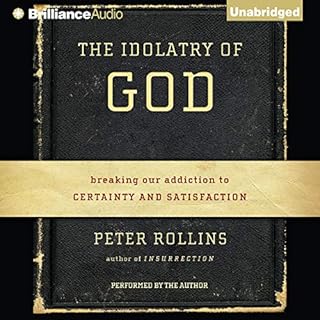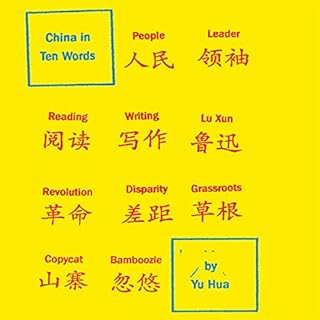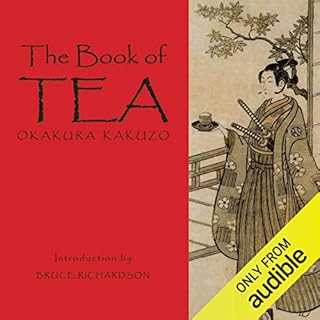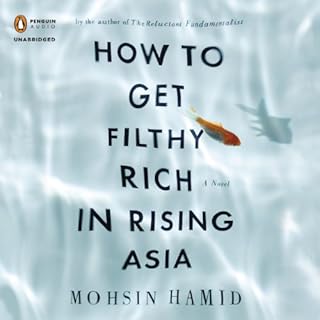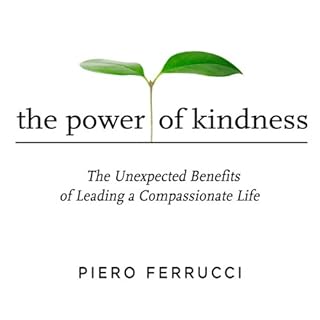taylor storey
- 25
- reviews
- 201
- helpful votes
- 77
- ratings
-
The Idolatry of God
- Breaking Our Addiction to Certainty and Satisfaction
- By: Peter Rollins
- Narrated by: Peter Rollins
- Length: 5 hrs and 2 mins
- Unabridged
-
Overall4.5 out of 5 stars 271
-
Performance4.5 out of 5 stars 245
-
Story4.5 out of 5 stars 238
Whether listeners are devout believers or distant seekers, The Idolatry of God shows that we must lay down our certainties and honestly admit our doubts to identify with Jesus. Rollins purposely upsets fundamentalist certainty in order to open listeners up to a more loving, active manifestation of Christ’s love. In contrast to the usual understanding of the "Good News" as a message offering satisfaction and certainty, Rollins argues for a radical and shattering alternative. He explores how the Good News actually involves embracing the idea that we can’t be whole, that life is difficult, and that we are in the dark.
-
5 out of 5 stars
-
Finally.
- By Brandy Moehnle on 08-30-16
- The Idolatry of God
- Breaking Our Addiction to Certainty and Satisfaction
- By: Peter Rollins
- Narrated by: Peter Rollins
very good
Reviewed: 04-01-17
possibly a little difficult of a book for the average reader, but after having been familiar with Rollins and some of his sources (zizek, Bonhoeffer, Nietzsche, Tillich) very appreciated. lots of excellent life giving (though sometimes seemingly life destroying!) messages in here. you have to lose your life in order to find it...
Something went wrong. Please try again in a few minutes.
You voted on this review!
You reported this review!
-
China in Ten Words
- By: Yu Hua, Allan H. Barr - translator
- Narrated by: Don Hagen
- Length: 7 hrs and 47 mins
- Unabridged
-
Overall4.5 out of 5 stars 290
-
Performance4.5 out of 5 stars 254
-
Story4.5 out of 5 stars 254
From one of China’s most acclaimed writers, his first work of nonfiction to appear in English: a unique, intimate look at the Chinese experience over the last several decades, told through personal stories and astute analysis that sharply illuminate the country’s meteoric economic and social transformation. Characterized by Yu Hua’s trademark wit, insight, and courage, China in Ten Words is a refreshingly candid vision of the “Chinese miracle” and all its consequences, from the singularly invaluable perspective of a writer living in China today.
-
4 out of 5 stars
-
Best Popular Book on China
- By taylor storey on 09-21-14
- China in Ten Words
- By: Yu Hua, Allan H. Barr - translator
- Narrated by: Don Hagen
Best Popular Book on China
Reviewed: 09-21-14
Fantastic book! I have now read 3 "popular" style books written about China, this is by far the best one. (The others were Dreaming in Chinese by Fallows- pretty good from a linguistics angle and Lost on Planet China by Troost - not horrible, but there's a lot better out there i'm sure). The author of this book, Yu Hua, is a prominent Chinese author who lives in Beijing/Hangzhou. He has written a number of very successful Chinese novels. This one, is ten essays on various parts of China. It is banned in China. It's a chinese person being honest about the Chinese government and history. This is a gold mine.
Reading and Copycat were probably my two favorite essays. In the first, he talks about growing up in the cultural revolution and scrounging around for books to read. He almost never gets past Mao's little red book and Lu Xun's various writings. He does find some books that have been extremely battered, often only partially surviving to feed his literary desires.
In copycat he talks about the chinese mentality behind making copycat products. A couple of times he has had fictitious interviews of him published and he will confront a reporter on it and the reporter simply says "it's copycat" and in the chinese culture, that justifies it.
There are many good things for him to say about China as well. This book was well written, engaging and so helpful for someone living in China to understand it a bit more. I enthusiastically recommend it to anyone looking for a thoughtful, accessible, historical and contemporary read on modern China.
Something went wrong. Please try again in a few minutes.
You voted on this review!
You reported this review!
8 people found this helpful
-
The Book of Tea
- By: Okakura Kakuzō
- Narrated by: Nicholas Tekoski
- Length: 2 hrs and 14 mins
- Unabridged
-
Overall4 out of 5 stars 124
-
Performance4 out of 5 stars 105
-
Story4 out of 5 stars 108
Here is a minor classic of the Orient. It is perhaps the most entertaining, most charming explanation and interpretation of traditional Japanese culture in terms of the tea ceremony. First published in 1906, it traces the custom from its roots in Taoism to its role as a Zen meditative discipline.
-
4 out of 5 stars
-
The History of the East's Aesthetic
- By taylor storey on 09-21-14
- The Book of Tea
- By: Okakura Kakuzō
- Narrated by: Nicholas Tekoski
The History of the East's Aesthetic
Reviewed: 09-21-14
First off, not really about tea. It's an overview of the history and philosophy of China and Japan through talking about tea. Okakura is a Japanese author who learned English at a young age, written in 1906.
I found this book by clicking around on some links about Wabi-Sabi and because of my love for Chinese Tea I decided to read this one. The tea ceremony's I have been involved in are certainly rich, simple, peaceful experiences, it has a similar effect as yoga on mind and body. I hope to drink several cups of various asian varieties of tea every day for the rest of my life.
I would recommend this short book to anyone interested in Asia, it's history and philosophy, and as well, it's tea. Especially the westerner. The author being Japanese but well versed in western thought (through his early command of the english language) offers a great rebuttal to the attitude of the west towards Asia, which I wish so bad us westerners could catch on to. That can be found especially in the beginning, but certainly throughout.
"They (the tea-masters) have given emphasis to our natural love of simplicity, and shown us the beauty of humility."
Some more quotes:
"There is a subtle charm in the taste of tea which makes it irresistible and capable of idealization."
"Lotung, a Tang poet, wrote: “The first cup moistens my lips and throat, the second cup breaks my loneliness, the third cup searches my barren entrail but to find therein some five thousand volumes of odd ideographs. The fourth cup raises a slight perspiration,— all the wrong of life passes away through my pores. At the fifth cup I am purified; the sixth cup calls me to the realms of the immortals. The seventh cup— ah, but I could take no more! I only feel the breath of cool wind that rises in my sleeves." --- Surprisingly, the tea after drinking a couple cups has these effects! It's way different than the caffeine high from coffee as well. It's a much more hydrated, non-jittery feeling. The author describes the tea ceremony as being derived from the practice of Buddhist monks drinking tea before their altars. It can easily be a spiritual, life-giving experience.
“If people of inferior intelligence hear of the Tao, they laugh immensely. It would not be the Tao unless they laughed at it.”
"Hide yourself under a bushel quickly, for if your real usefulness were known to the world you would soon be knocked down to the highest bidder by the public auctioneer. Why do men and women like to advertise themselves so much? Is it not but an instinct derived from the days of slavery?"
Something went wrong. Please try again in a few minutes.
You voted on this review!
You reported this review!
4 people found this helpful

-
Fahrenheit 451
- By: Ray Bradbury
- Narrated by: Stephen Hoye
- Length: 5 hrs and 37 mins
- Unabridged
-
Overall4 out of 5 stars 956
-
Performance4 out of 5 stars 836
-
Story4 out of 5 stars 845
The system was simple. Everyone understood it. Books were for burning, along with the houses in which they were hidden. Guy Montag was a fireman whose job it was to start fires. And he enjoyed his job. He had been a fireman for ten years, and he had never questioned the pleasure of the midnight runs or the joy of watching pages consumed by flames, never questioned anything until he met a seventeen-year-old girl who told him of a past when people were not afraid.
-
3 out of 5 stars
-
Classic tale deserves a better narrator
- By happy weaver on 04-16-14
- Fahrenheit 451
- By: Ray Bradbury
- Narrated by: Stephen Hoye
Dystopia, Books and Firefighters
Reviewed: 09-21-14
1. Dystopia novel. Futuristic. Lots of problems with the government in the future.
2. They don't give good history anymore. Montag is a fireman. but he goes around and burns the books in the houses that are now completely fireproof. Which is what he believes all firemen have done.
3. The book is about books. Lots of great quotes about the value of literature.
4. I didn't know this until after I read, but Bradbury was mostly self educated through reading. He graduated from a los angeles high school and never went to college.
5. Interesting to see the way he describes the people who continue to read. They are not part of the system, so they are not particularly wealthy, or successful, but they are more alive than any other human being. It really inspires me to continue reading, continue wondering about the world.
"Give the people contests they win by remembering the words to more popular songs or the names of state capitals or how much corn Iowa grew last year. Cram them full of noncombustible data, chock them so damned full of ‘facts’ they feel stuffed, but absolutely ‘brilliant’ with information. Then they’ll feel they’re thinking, they’ll get a sense of motion without moving....Don’t give them any slippery stuff like philosophy or sociology to tie things up with."
"Stuff your eyes with wonder,’ he said, ‘live as if you’d drop dead in ten seconds. See the world. It’s more fantastic than any dream made or paid for in factories. Ask no guarantees, ask for no security, there never was such an animal."
Something went wrong. Please try again in a few minutes.
You voted on this review!
You reported this review!
-
How to Get Filthy Rich in Rising Asia
- A Novel
- By: Mohsin Hamid
- Narrated by: Mohsin Hamid
- Length: 4 hrs and 34 mins
- Unabridged
-
Overall4.5 out of 5 stars 1,194
-
Performance4.5 out of 5 stars 1,030
-
Story4.5 out of 5 stars 1,028
From the internationally bestselling author of The Reluctant Fundamentalist, the boldly imagined tale of a poor boy's quest for wealth and love. His first two novels established Mohsin Hamid as a radically inventive storyteller with his finger on the world's pulse. How to Get Filthy Rich in Rising Asia meets that reputation - and exceeds it.
-
5 out of 5 stars
-
The title is misleading, I loved this quick read.
- By Brad Mills on 04-28-17
- How to Get Filthy Rich in Rising Asia
- A Novel
- By: Mohsin Hamid
- Narrated by: Mohsin Hamid
Excellent Fiction Writer
Reviewed: 09-21-14
Obviously, the title has almost nothing to do with the main idea of the book. It is written in the style of a self help book (2nd person!) but is really chronicling the life of a man who does become wealthy for a time. This book, perhaps more than any I have read, portrays an honest look at what it is like being an average human. The character (you!) has conflicting emotions, a hard set of circumstances but a mostly hopeful disposition, which turns to being driven and finally somewhat retrospective.
I can never tell if this book's story is set in the author's home country of Pakistan or in what I perceive to be "rising Asia" -Eastern Asia. I assume it to be the former.
I didn't like this one quite as much as "the reluctant fundamentalist" though they both have a similar quality. I get the sense the quality is that they feel like they are intended for an American audience to get a grasp on what it is like for others in our world. I said earlier "an average human" because I think us Americans don't often understand what the average human is like. We (Americans) represent only 250 million of this world of 6+ billion people. In my experience of living abroad, this gets at the average human as i understand it.
I liked that the book seemed to have a grasp on real humanity. Hamid stays near the details of life and doesn't overhype any of it. I listened to the audiobook of hamid's reading of it and though his voice bordered on monotone, I think it was actually quite helpful.
Something went wrong. Please try again in a few minutes.
You voted on this review!
You reported this review!
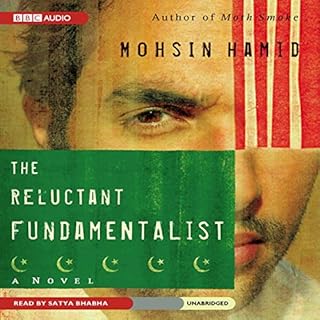
-
The Reluctant Fundamentalist
- By: Mohsin Hamid
- Narrated by: Satya Bhabha
- Length: 4 hrs and 36 mins
- Unabridged
-
Overall4 out of 5 stars 740
-
Performance4.5 out of 5 stars 575
-
Story4 out of 5 stars 580
At a cafe table in Lahore, a bearded Pakistani man converses with a suspicious, and possibly armed, American stranger. As dusk deepens to night, he begins the tale that has brought them to this fateful meeting. Changez is living an immigrant's dream of America. At the top of his class at Princeton, he is snapped up by Underwood Samson, an elite investment firm. He thrives on the energy of New York. But in the wake of September 11, he finds his position in his adopted city suddenly overturned.
-
1 out of 5 stars
-
Disappointed
- By VKassardjian on 11-30-12
- The Reluctant Fundamentalist
- By: Mohsin Hamid
- Narrated by: Satya Bhabha
One of the Best Audiobooks I've Ever Listened To
Reviewed: 09-21-14
Wow. Next level fiction here. To be honest, it took about half the book for me to get really engaged in the story, but I did get there.
Take a look at Mohsin Hamid's resume and it will give you a hint on what's going on here. Born in Pakistan, lived in the states for a bit, returned to Pakistan, came back and went to Princeton for undergrad, harvard law school, took a job at a big time law firm, but decided it was too boring (per wikipedia). He's written for almost every respectable publication and was named one of the world's top 100 global thinkers by Foreign Policy Magazine. Somewhere in there he became a dual citizen: UK and Pakistan.
He absolutely kills it in this book (California slang for "does a really good job"). Here are the main parts I see in it:
1. He's in love with a woman who periodically stops responding to him. He thinks she is not interested, and maybe that is what it is, but he keeps racking his brain on what it is and tries different angles to reach her.
2. He is a Pakistani who lives and works in high profile america. He always feels like an outsider. Then 9/11 happens and he feels even more like an outsider.
3. His job is appraising companies and he does a good job of it, but in appraising Philipino and Chilean companies he realizes he is feeding the American engine that is disrupting the lives of many around the world. It may be a shock to Americans, but it is a very honest one, and I think it is really valid. I am an american who has lived in Mexico, Israel and now China with a lot of travel in between. Hamid contributes thinking that the west, but especially Americans desperately need to at least be aware of and likely, begin to adopt.
He struggles with that and with his family being in a place that is on the edge of war. He sees the effect the US's activity in Afghanistan is having and I think helps us to see it in an honest way.
After reading this book, I am excited to pick up his other works and delve into his thinking more. ... did I mention this book is short? 4 and a half hours on audio.
Something went wrong. Please try again in a few minutes.
You voted on this review!
You reported this review!
3 people found this helpful
-
Living in Christ's Presence
- Final Words on Heaven and the Kingdom of God
- By: Dallas Willard, John Ortberg
- Narrated by: Dallas Willard
- Length: 7 hrs and 5 mins
- Unabridged
-
Overall5 out of 5 stars 649
-
Performance5 out of 5 stars 540
-
Story5 out of 5 stars 537
Dallas Willard and John Ortberg explore what it means to live well now in light of God's kingdom. They reflect on the power of the Trinity in our lives, the meaning of knowledge, the importance of spiritual disciplines and much more. Dallas Willard offers poignant thoughts about what it will be like to transition into the very presence of Christ in heaven. This audiobook is adapted from the talks given at the February 2013 Dallas Willard Center "Knowing Christ Today" conference in Santa Barbara, California.
-
5 out of 5 stars
-
Let Go of Control
- By taylor storey on 09-21-14
- Living in Christ's Presence
- Final Words on Heaven and the Kingdom of God
- By: Dallas Willard, John Ortberg
- Narrated by: Dallas Willard
Let Go of Control
Reviewed: 09-21-14
Despite the title laden with all kinds of connotations, this is a phenomenal book. The book is really the summary of a conference put on by Willard and his friend/mentee John Ortberg. The conference was for pastors of churches and it turned out to be Dallas Willard's last work before he died.
I listened to the audio of the conference (which was at least slightly edited from the conference) and flipped through the book, reading about half of it in review. The book is also cleaned up a bit from the audio version.
1. I'm currently on a quest to discern what it is about my conservative christian roots that is so off-putting to myself and others.
2. I've always been fascinated by Dallas Willard being such an influential christian while his day job had him in the philosophy department of a major university (USC). From a couple of comments from my Aunt who recently listened to this I decided to start here, at the end of his works.
If Dallas Willard had a church, I think I may enjoy it. There are 2 really important pieces from this book that make me think I would enjoy a community with Dallas Willard leading it.
1. There is a recurring idea letting go of control in almost every aspect of christianity. One of the most gripping examples is when he speaks of himself as a young pastor: "I thought the way to move someone was to make them feel, not provide them with knowledge." He has since learned that making someone feel is manipulative, and providing someone with knowledge is empowering. If there is any single piece keeping people out of conservative christianity, it is probably this one. He states the problem and applications in a few different ways throughout the book and states it well. Do your best and let go.
2. Willard (and Ortberg) puts a lot of emphasis on life now rather than life after death. "Your kingdom come... on earth as it is in heaven" so we are not leaving to go to heaven, heaven is coming to earth. I think between Dallas Willard and NT Wright's influence the conservative christian church is doing a lot better job of this.
John Ortberg was a big part of this conference. It seems pretty obvious his goal was to make Dallas Willard accessible and applicable to the pastors in the audience. I think he splits his time accomplishing that goal and also pulling the listeners back towards an organizational, application-at-all-costs misunderstanding of what Willard is saying. Careful not to treat people like machines rather than people/friends Ortberg! Suffice it to say I skipped through a good portion of his talks. At one point Ortberg makes a joke while interviewing Willard that was clearly not the time for a joke, but Ortberg missed the depth of what Willard was saying. I think it was cleaned up in the book, but you will probably notice it if you listen to the audio.
Not too long of a book/audio, highly recommended for anyone interested in a "sense of pervasive well-being" (willard's definition of joy) or anyone wanting to better communicate the message of Christianity.
Something went wrong. Please try again in a few minutes.
You voted on this review!
You reported this review!
12 people found this helpful

-
Looking for Alaska
- By: John Green
- Narrated by: Jeff Woodman
- Length: 7 hrs and 6 mins
- Unabridged
-
Overall4 out of 5 stars 6,984
-
Performance4.5 out of 5 stars 6,167
-
Story4 out of 5 stars 6,196
Miles Halter is fascinated by famous last words - and tired of his safe life at home. He leaves for boarding school to seek what the dying poet François Rabelais called "The Great Perhaps." Much awaits Miles at Culver Creek, including Alaska Young, who will pull Miles into her labyrinth and catapult him into the Great Perhaps.
-
5 out of 5 stars
-
Humorous YA for Adults
- By FanB14 on 05-24-12
- Looking for Alaska
- By: John Green
- Narrated by: Jeff Woodman
TFIOS is Better!
Reviewed: 09-21-14
Picked this one up after reading "the fault in our stars". I like John Green as an author. He writes page turning young adult fiction that isn't just young adult fiction. He's got some serious themes in both of his books that I have read.
"Looking for Alaska" is about a boy who goes to a new school and his new friend group. For the first half of the book it was pretty standard young adult fiction in my opinion with none of the serious themes worked in. Then the event happens (the chapters of the book are set up in an BC/AD method with a certain event being the turning point).
Once that happened, the book grabbed my attention and a similar theme to "the fault in our stars" was brought up - what is the point of life? how do we get out of the "labyrinth of suffering"?
The answer is somewhat ambiguous, but the idea is that the suffering does not have to define us, "we are as indestructible as we believe ourselves to be." Reminds me of a Henry David Thoreau Quote: "I know of no more encouraging fact than the unquestionable ability of man to elevate his life by conscious endeavor.
Another thing I liked about the book is the snippets of the world religions class teacher, Mr. Hyde. This character does a great job of periodically inserting some great pieces about the value of Buddhism, Islam and Christianity.
Because it took so long to get going and even when it did the plot and the theme didn't hit me as hard as "The Fault in Our Stars" did, i'm only giving it 3 stars. Could have been 4, but I think there are better books out there. Still, for fans of the genre, I think John Green is a top shelf writer.
Something went wrong. Please try again in a few minutes.
You voted on this review!
You reported this review!
-
The Power of Kindness
- The Unexpected Benefits of Leading a Compassionate Life
- By: Piero Ferrucci
- Narrated by: Mitch Horowitz
- Length: 6 hrs and 50 mins
- Unabridged
-
Overall4 out of 5 stars 529
-
Performance4.5 out of 5 stars 473
-
Story4 out of 5 stars 473
The Power of Kindness is a stirring examination of a simple but profound concept. Piero Ferrucci, one of the world's most respected transpersonal psychologists, explores the many surprising facets of kindness and argues that it is this trait that will not only lead to our own individual happiness and the happiness of those around us, but will guide us in a world that has become cold, anxious, difficult, and frightening.
-
4 out of 5 stars
-
Survival of the fittest = Kindest?
- By taylor storey on 09-21-14
- The Power of Kindness
- The Unexpected Benefits of Leading a Compassionate Life
- By: Piero Ferrucci
- Narrated by: Mitch Horowitz
Survival of the fittest = Kindest?
Reviewed: 09-21-14
Is it possible that "survival of the fittest" can be interpreted in human history as "survival of the kindest" ? Pierro Ferrucci, presumably his uncle Aldous Huxley and the Dalai Lama would say yes.
I walked into a bookshop and didn't find it so I asked the bookseller if it was available. I was a little bit curious as he took me to the self-help section to find this book. It is pretty anecdotal, especially towards the later parts when he trades his literature references for more cute stories, but the basic premise is what I'm interested in and I think he brings up a good counterpoint to what seems like the harsh reality of our society.
It may seem like violence or being overall stronger, bigger, more rich etc is what makes us grow as individuals and as a society, but Ferrucci argues it is our kindness, our cooperation that takes us to the top.
Aldous Huxley after years of studying and observing said the best thing to do in order to live a more happy, fulfilled life was to "be a little more kind."
For those interested in this topic I would also recommend George Saunders' 2013 commencement speech at Syracuse University whose convincing argument is: "What I regret most in my life are failures of kindness."
and though I have not read it and it is very out of print you might check out Peter Kropotkin's "Mutual Aid as a Factor in Evolution"
I'm hesitant to give the book 4 stars because it is not a lot more than the main idea, but the main idea is so significant. Once you've got the main idea though, I think you've got the book. Easy read.
Something went wrong. Please try again in a few minutes.
You voted on this review!
You reported this review!
64 people found this helpful

-
Life of Pi
- By: Yann Martel
- Narrated by: Jeff Woodman
- Length: 11 hrs and 41 mins
- Unabridged
-
Overall4.5 out of 5 stars 15,598
-
Performance4.5 out of 5 stars 10,260
-
Story4.5 out of 5 stars 10,326
Pi Patel has been raised in a zoo in India. When his father decides to move the family to Canada and sell the animals to American zoos, everyone boards a Japanese cargo ship. The ship sinks, and 16-year-old Pi finds himself alone on a lifeboat with a hyena, an orangutan, a zebra with a broken leg, and a 450-pound Bengal tiger. Soon it's just Pi, the tiger, and the vast Pacific Ocean - for 227 days. Pi's fear, knowledge, and cunning keep him alive until they reach the coast of Mexico, where the tiger disappears into the jungle.
-
5 out of 5 stars
-
Despite myself, I loved this book
- By Jeff on 11-09-03
- Life of Pi
- By: Yann Martel
- Narrated by: Jeff Woodman
Just OK
Reviewed: 09-21-14
This is a story of a boy. A boy named Pi Patel. (he's actually piscina patel, but ... you get the idea) It's decent. He's from India and is immigrating to Canada. His Father is a zoologist and the animals are coming with him.
The ship goes down. Pi gets stranded on a boat, with animals. But there's actually a decent amount of story before he gets stranded on the boat.
I think the whole being stranded on a boat idea is a metaphor for human life. As in, we have enough of an idea to keep us going, but the question of human existence is kind of a mystery and we are hungry for more. There are also things that could eat us alive, and little bits that can sustain us.
Before he gets stranded on the boat, you learn he is religious. Like, 3 religions religious. Specifically Hindu, Christian and Muslim. Some people don't like that. Specifically the Hindus, Christians and Muslims. Interesting but kind of inconsequential commentary at that point.
I'm gonna get to the end of the story but before that, the moral of the story is: Some stories are more imaginative and creative. Those are better stories. Religions (or 3 religions) can be a better story than the factual. If you choose a better story, you may enjoy life more. (Donald Miller would approve? Read "A million miles in a thousand years" you'll know what i'm talking about.)
The most interesting part for me was at the end. But first, two things:
1. I'll be honest and say Yann Martel lost me when Pi was on the boat. Lots of symbolism and later there's some explanation for some of it, but it was too detailed or abstract and didn't hold my interest.
2.
SPOILER
ALERT!
DONT
GO
ANY
FURTHER
BECAUSE
I'M
GOING
TO
"SPOIL"
THE
STORY.
Pi ends up making it. There's a bunch of animals and they all die except the Tiger, who runs off when he finally lands in Mexico.
Afterwards, he gets interviewed by some Japanese guys who are part of the company who ran the boat that sank. They want to know why the boat sank. Pi tells them the story with the animals etc. They want a different more factual story and so he gives them one. (the animals represent people!) THEN!
he asks them if either story answers their question (about the boat sinking). It doesn't. then he asks which story is better. They say the one with animals.
So, Religion often doesn't answer the questions we are asking. Choose the one (or 3) with better stories.
Decent.
Something went wrong. Please try again in a few minutes.
You voted on this review!
You reported this review!
1 person found this helpful

